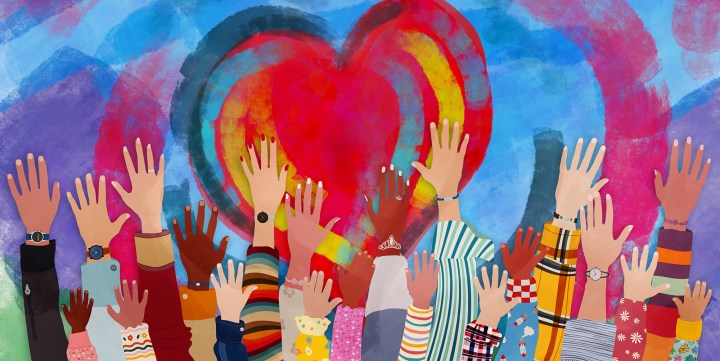OP-ED
NGOs are under attack by the South African state again – including the knitting clubs

Non-profits must be alert to a new threat to their freedom of association and ability to operate from a draft Intelligence Laws Amendment Bill.
In the previous bout of proposed legislation which sought to unnecessarily over-regulate the non-profit sector, a chance remark of mine in a presentation to a standing committee became a catch-phrase for the sector’s objection to the proposed ill-considered first iteration of the General Laws Amendment Bill – that “even knitting clubs” would be compelled to register to avoid the spectre of greylisting for South Africa.
The sensible submissions made by many on behalf of civil society were heard and the initial excesses and overreach of that bill were curtailed so that the compulsory registration requirement, in the General Laws Amendment Act (GLAA) of December 2022, now affects only organisations identified as potentially being at risk of being abused for money-laundering and terrorist financing.
Now your knitting club (or any other sort of non-profit) only has to register with the Non-Profit Organisations Directorate if its activities or funding flow from South Africa to another country.
The dust has barely settled on that GLAA and the sets of regulations issued under it, and it appears that knitting clubs have to take up cudgels again: this time against the rather more sinister impact of the General Intelligence Laws Amendment Bill 2023.
In terms of this, to be established and to “operate” in South Africa “non-governmental organisations and religious institutions” will be subjected to mandatory security “vetting” by the State Intelligence Services.
Security vetting is much more invasive than what banks put people through under the Financial Intelligence Centre Act (Fica) requirements and can involve anything from checking whether any leader/employee of an NGO has a criminal record, to (secretly) accessing personal information and data and subjecting you to a polygraph test.
Democracy Down: Ramaphosa’s proposed State Security vetting of NGOs an onslaught on SA’s future
Now we all know that vetting and security clearance for those who will be employed by the state and have access to state information and databases is a good and useful thing.
However, the state is not great at implementing its own standards – according to a 2019 report on a meeting of the Standing Committee on Public Accounts (Scopa), at that time only 21 of 121 senior Eskom employees had been vetted.
Entire government departments and state entities refused to have their employees vetted. Government departments were found to be ignoring vetting reports and employing people with criminal records.
There are many theories on what motivates the current ill-conceived (and poorly executed) attack on civil society. One version is that the government is just doing the only thing it seems it can do, which is pass more laws instead of actually, properly and consistently implementing the laws it already has.
Others believe that this new bill amounts to misdirection and scapegoating in an attempt to distract public attention from the criminal activities, nepotism and general bungling that abounds at all levels of government by drawing attention to “NGOs and religious institutions” which, apparently, just by existing, pose some sort of threat to the security of South Africa.
Another theory is that the half-baked bill is a feint at the sort of legislation that is really required to hold security services to account.
Whatever the intention behind the legislation, while there may be some NGOs set up for nefarious reasons and some religious institutions that are not what they claim to be, there are already laws in place to deal with these sorts of transgressions – and these miscreants are not, on the whole, impinging on state or national security.
If bogus NGOs and cults want to do business with the state then they should certainly be subject to appropriate security clearance processes.
But it is state overreach, abuse of power and just unconstitutional to require that those who start or administer every non-profit in the country should be subject to a vetting process that is invasive, unnecessary, and utterly impossible to implement.
The drafters of the General Intelligence Laws Amendment Bill (like the drafters of last year’s GLAA) have underestimated the size and scope, the lengths and depths of civil society in South Africa.
They have also underestimated its ability, when under existential threat, to gather, to agitate, to educate and disseminate, and to mount a vociferous and indefatigable opposition to attempts to curtail freedom of association and the ability to get on with their “knitting” unmolested by egregious unfounded legislation.
Non-profits, knitting clubs included, are holding together the fabric of South Africa and doing the essential work that the government is neglecting or failing at.
Let us get on with our work. DM
Nicole Copley, founder of ngoLAW and member of the NPO Working Group, was part of the team that prevailed against the 2022 General Laws Amendment Bill compulsory registration provisions.


















 Become an Insider
Become an Insider
Brilliant article. Nailed it!
Agreed. More regulation is not what civil society needs in South Africa – especially when considering the community-embedded, micro nature of the majority of socially focused organisations. Our inequality means that we really do need to look past these big-stick regulatory mechanisms and focus instead on what it is that they NGOs need, to be better at what they do.
CONGRATOLATIONS BILLION BIG BANK RATU MAS KENCANA ROOM-CODE ALFHA OMEGA-777-MMM-TVM-LSM-666
It reflects the ANC and Communist Party’s continued belief that all aspects of society should be under State control. NGOs are perceived as dangerous because they contribute to society but are independent entities. Autonomy and independent thinking are are nurtured by NGOs, and that reduces dependence on the State, which is counterrevolutionary, even when it is a knitting club.